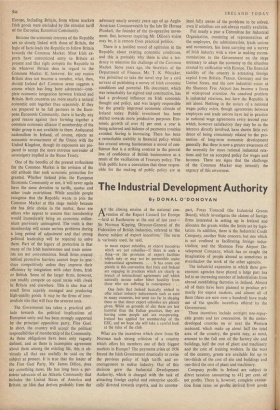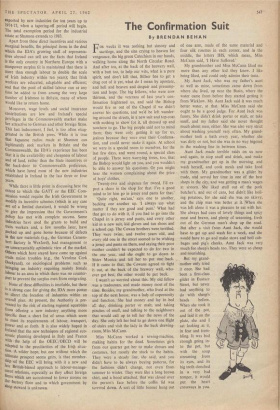The Industrial Development Authority
By DONAL O'DONOVAN
T the closing session of the national con- .vention of the Export Council for Europe —held at Eastbourne at the end of last year— Sir Norman Kipping, Director-General of the Federation of British Industries, referred to 'the thorny subject of export incentives.' The term is variously used, he said, to mean export subsidies, or export incentives which are not subsidies—if there is such a thing—or the provision of export facilities which may or may not be permissible under international agreements. . . . It has come out plainly in this convention that Italy and Ireland are engaging in practices which are clearly in breach of international agreements and which naturally arouse rather bitter hostility from those who are suffering in consequence. . .
One feels that Ireland basically wished to offer infant industry inducements such as exist in many countries, but went too far in shaping these so that direct export subsidies are plainly given. While on grounds of size these are less harmful than the Italian practices, they are hurting some people and are exasperating. Ireland has applied for membership of the EEC, and we hope she will take a careful look at the rules of the club.
What are the incentives which drew from Sir Norman such strong criticism of a country which offers his members one of their biggest markets in Europe? The payments crisis of 1956 forced the Irish Government drastically to revise the previous policy of high tariffs and en- couragement to native industry. Out of this decision grew the Industrial Development Authority, which is charged with the task of attracting foreign capital and enterprise specifi- cally directed towards exports, and its counter- part, Foras Tionscail (the Industrial Grants Board), which investigates the claims of foreign firms interested in setting up in Ireland and allocates the grants within the limits set by legis- lation. In addition, there is the Industrial Credit Company, another State concern, but one which is not confined to facilitating foreign indus- trialists; and the Shannon Free Airport De- velopment Company, which has so caught the imagination of people abroad as sometimes to overshadow the work of the other agencies.
The industrial expansion in which these gov- ernment agencies have played a large part has led to an increasing number of industrialists from abroad establishing factories in Ireland. Almost all of them have been planned to produce pri- marily for export markets, and almost all of them (there are now over a hundred) have made use of the specific incentives offered by the Government.
These incentives include outright non-repay- able grants and tax concessions. In the under- developed counties on or near the Western seaboard, which make up about half the total area of the country, the grants may, at most, amount to the full cost of the factory site and buildings, half the cost of plant and machinery and the cost of training workers. In the west of the country, grants are available for up to two-thirds of the cost of site and buildings and one-third the cost of plant and machinery.
Company profits in Ireland are subject to direct taxation amounting to 411 per cent. of net profits. There is, however, complete exemp- tion from taxes on profits derived from goods exported by new industries for ten years up to 1974-75, when a tapering-off period will begin. The total exemption period for the industrial estate at Shannon extends to 1983.
Apart from these direct incentives and various marginal benefits, the principal items in the deal which the IDA's growing staff of representa- tives abroad can sell are the facts that Ireland is the only country in Northern Europe with a manpower surplus (it is maintained that there is more than enough labour to double the scale of Irish industry within ten years); that Irish workers are educated, adaptable and efficient; and that the pool of skilled labour can at any time be added to from among the very large number of Irishmen in Britain, many of whom would like to return home.
Moreover, wage levels and social insurance contributions are low and Ireland's special privileges in the Commonwealth market make her attractive to German and other foreign firms. This last inducement, I feel, is too often exag- gerated in the British press. While it is true that Japanese radios made at Shannon can legitimately seek markets in Britain and the Commonwealth, the IDA's experience has been that it is the availability and cheapness of labour and of land, rather than the State incentives or the back-door to Commonwealth preference, which have lured most of the new industries established in Ireland in the last three or four Years.
While there is little point in discussing here the extent to which the GATT or the EEC Com- mission would require the Irish Government to modify its incentive schemes (which in any case are of a limited duration), it would be wrong to give the impression that the Government's Policy has met with complete success. Some industries have used the grants to build and train workers and, a few months later, have Packed up and gone home because of defects In the raw materials (e.g., the German Camem- bert factory in Wexford), bad management or an unwarrantably optimistic view of the market. Others which have stayed have come up against trade union troubles (e.g., the Verolme Cork Dockyard), or sociological problems such as bringing an industry requiring mainly female labour to an area in which there was no counter- Part to prevent the surplus men from emigrating.
None of these difficulties is insoluble, but there is a strong case for giving the IDA more power to direct the location of industries within an overall plan. At present, the Authority is pre- vented by the risk of starting regional squabbles from offering a new industry anything more specific than, a short list of areas which seem to meet its requirements of labour, transport, Power and so forth. It is also widely hoped in Ireland that the new techniques of regional eco- nomic planning developed in Italy and France With the help of the OEEC/OECD will be adapted to the peculiarities of the Irisj3 situa- tion. A wilder hope, but one without which the ultimate prospect seems grim, is that member- ship of the EEC will bring with it a new and less British-biased approach to labour-manage- ment relations, especially as they affect foreign firms which are accustomed to fewer storms on the factory floor and to which government by shop steward is unknown.















































 Previous page
Previous page